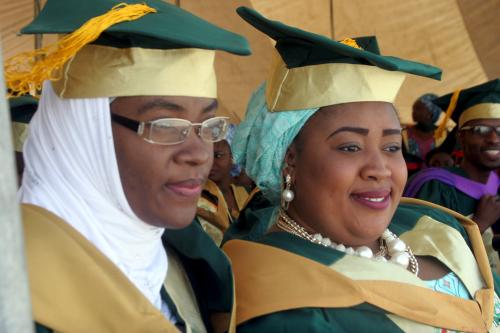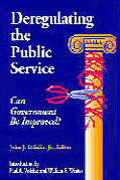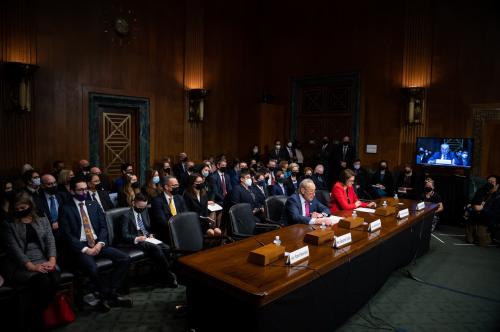Happy International Women’s Day from Brookings’ FixGov blog. As the managing editor of this blog, I want to take the opportunity to “mansplain” something to you that you probably don’t know or understand: how grateful I am for the women around me who make this blog as successful, informative, and thoughtful as it is. You surely don’t know this because I, like many of my colleagues at Brookings and across academic disciplines, do not take the time to express that gratitude often enough.
FixGov exists because of a team effort—a team I am lucky enough to be a part of. It begins with the leadership of the Center for Effective Public Management’s director, Elaine Kamarck, who has carved an impressive path in academia, public policy, party politics, and the White House to elevate this blog’s content, timeliness, and creativity. In addition, I count on a diverse, strong, impressively intelligent cadre of women scholars in Brookings’ Governance Studies program—and across the institution’s five programs—as well as those external to Brookings to provide some of the finest analysis of politics and policy you will find anywhere. I will not name them, not because of a lack of appreciation, but because our team has the privilege of working with so many individuals who fit that description that there are too many to list. In a male-dominated—and especially white male-dominated—profession, that diversity often fails to show its face or be appreciated. Yet, it is the combination of empirical analysis and rigor that is indistinguishable by gender, enhanced by a perspective that women are uniquely able to offer, that so often elevates this blog’s content.
However, behind the bylines we have a team of colleagues who power this blog from start to finish. Research assistants, communications professionals, web gurus, social media savants, and others make sure that FixGov is accurate, polished, well-edited, timely, relevant, and widely read. Chief among them are Christine Stenglein our editorial associate, Liz Sablich our Communications Director, and Tracy Viselli our senior advisor for strategic communications for domestic policy programs. This team is not a group of extraordinarily talented female professionals. No. This is a group of extraordinarily talented professionals, most of whom who happen to be female.
In many ways, it is pathetic that I need a day of recognition—International Women’s Day—to recognize the importance of the women around me and our team. And while I do my best to support and show my appreciation to our colleagues on a regular basis, I am certain that I fall into a broad category of men—and yes, women, too—who fail to express that gratitude as often as it is due.
One easy exercise on this day—especially if you’re male, but even if you’re not—is to think about what your work life would be like but for the extraordinary role that women play every day. I know my research would be weaker; my writing would be more superfluous (and perhaps this post is evidence of that); my work would be less well-read; and whatever is my impact in the fields of political science and public policy, it would be greatly diminished.
In fact, but for the important role of powerful women in my life—specifically a mother, a grandmother, a great aunt (though she would kill me for adding the “great” to that title)—constantly encouraging me and pushing me to do better, I likely would not have gone to college. But for a corps of (mostly) female public school teachers throughout my K-12 education, I likely would not have been as successful in college. But for a remarkably talented and caring college advisor, I would never have found empirical research to be my calling and would have never considered a graduate degree (thanks Virginia Hettinger). And but for an extremely supportive, patient, encouraging, strong, independent, successful and loving wife, I would have never finished a doctorate.
Each of us, no matter who you are and where you work, owe a lot of people for the success we have had—many of them male, many of them female. On a day like today, take a step back and thank all those women who have and will continue to contribute to it. But do more than say thanks. Examine your professional environment and think deeply about whether you and your colleagues create an environment of respect, excellence, and development. Think about those you work closely with, collaborate with, rely on, and mentor. Are you doing enough to ensure that those you work with, regardless of title, are colleagues rather than just coworkers or staffers? Do you advocate for the women around you to ensure they command the respect, salary, and opportunities they deserve? Finally, do you foster an environment where your female colleagues can feel like they can discuss a difficult, uncomfortable, or troubling situation that may be outside any situation you will experience as a male?
Surely, we can all do better. And we can do better beyond International Women’s Day. In editing this blog post, a remarkably talented colleague suggested writing that it is important to make sure “talented women don’t wither on the vine all year long” after International Women’s Day is over. She is right. And that such language was not in my original draft reinforces that difference of experience and perspective.
So, on International Women’s Day muster the courage to ask, “where would I be, but for the strong women in my life?” After asking yourself that question, if you’re anything like me, do your best not to shudder at the answer.








Commentary
Who runs FixGov? Women do.
March 8, 2018